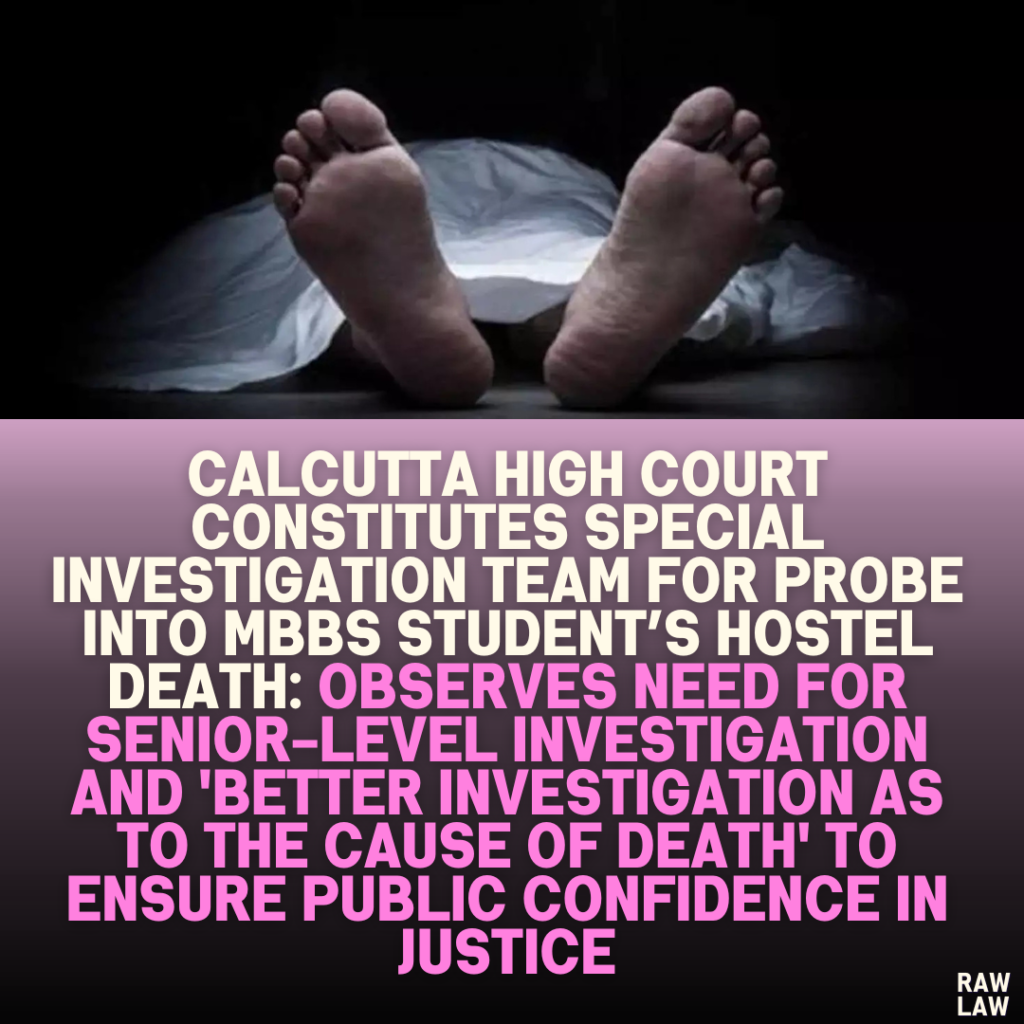Court’s Decision:
The Calcutta High Court directed the constitution of a Special Investigation Team (SIT) to investigate the death of an MBBS student in his hostel. The court emphasized the need for a better investigation and deemed that leaving the probe at the Sub-Inspector level was insufficient for justice to be served. The SIT will be led by an officer of the rank of Superintendent of Police, with members selected at the discretion of the head of the SIT.
Facts:
- The petitioner is the father of the deceased, who was a medical student pursuing an internship in an MBBS program.
- The deceased was found dead in the hostel of the medical college where he was staying.
- Initially, the police filed a report stating that the case involved a “mistake of fact” and closed the matter.
- Dissatisfied with the findings, the petitioner challenged this report in the jurisdictional court, leading to a direction for reinvestigation.
- The police conducted a reinvestigation but maintained that the death resulted from injuries sustained in a fall. Forensic experts supported this conclusion, noting that the victim had fallen from a height.
- Despite the reinvestigation, the petitioner alleged that the inquiry was inadequate and sought the court’s intervention to form an SIT for a more comprehensive and impartial investigation.
Issues:
- Was the existing investigation by the police sufficient to uncover the cause of the student’s death?
- Did the circumstances of the case warrant the formation of an SIT to ensure a fair and thorough investigation?
Petitioner’s Arguments:
- Inadequate Investigation: The petitioner contended that the investigation lacked depth and objectivity, primarily due to its conduct by the same police agency that had initially filed a “mistake of fact” report.
- Need for SIT: He argued that the case’s complexity and sensitivity required the formation of an SIT to ensure a fair, independent, and thorough probe.
- Allegation of Bias: The petitioner emphasized that the current investigative team might not deliver an impartial result due to its involvement in the initial flawed investigation.
Respondent’s Arguments:
- Thorough Investigation Conducted: The State submitted that the investigation was detailed and relied on forensic evidence, which concluded that the victim succumbed to injuries sustained from a fall.
- Steps Taken: It was pointed out that the investigating team had sought and partially received call details from the victim’s service providers, and statements of key witnesses, including the last person to call the victim, were recorded under Section 164 of the Criminal Procedure Code.
- No Evidence of Foul Play: The forensic and post-mortem reports were consistent in concluding that the death was accidental and not due to any external intervention.
Analysis of the Law:
- Jurisdiction to Replace Investigative Agency:
- The court reiterated that jurisdictional courts have limited authority to substitute the investigating agency. Such powers are typically reserved for constitutional courts and are to be exercised sparingly.
- The substitution of the investigating agency is warranted only in cases where there is a significant lapse in the investigation or a reasonable apprehension of bias.
- Need for Better Investigation:
- The court acknowledged that investigations carried out at a lower level (Sub-Inspector rank) might not inspire confidence in cases involving grave allegations.
- To maintain public trust and ensure justice, it is imperative to involve senior officials for a more comprehensive probe.
Precedent Analysis:
The court’s decision aligns with principles from past judgments, which state that:
- Investigative substitution is a rare step, necessitated only in cases where justice appears to be compromised by lapses in the ongoing probe.
- A higher level of scrutiny is justified in cases involving the death of individuals in unusual or suspicious circumstances, especially when public confidence is at stake.
Court’s Reasoning:
- Scope for Better Investigation:
- The court found that the existing investigation lacked sufficient depth to uncover all aspects of the case.
- It determined that leaving the investigation at the Sub-Inspector level, given the complexity of the matter, would not suffice.
- Constitution of SIT:
- The court held that a more senior officer, at the level of Superintendent of Police, should lead the investigation, supported by a team of officers chosen by the head of the SIT.
- It observed that this arrangement would ensure a more effective and credible investigation.
- Directive for Formation of SIT:
- The SIT was directed to be constituted within seven days from the communication of the court’s order.
- The officer heading the SIT was given discretion to select team members to aid in the investigation.
Conclusion:
The court disposed of the appeal by ordering the constitution of an SIT, ensuring that a more senior officer leads the investigation into the death of the MBBS student. The order highlighted the need for fairness and impartiality in cases where public trust in the investigation is at stake.
Implications:
- Public Confidence in Justice: This judgment reinforces the judiciary’s role in ensuring that investigations are impartial, thorough, and inspire confidence in the public.
- Guidelines for Investigative Authority: The decision underscores the importance of assigning sensitive cases to senior officers when existing investigations appear inadequate or compromised.
- Precedent for SIT Formation: This ruling may serve as a reference for future cases where investigations by lower-level officials are challenged for lack of depth or fairness.




Pingback: Bombay High Court Denies Full Stay on ₹5.86 Crore Tax Demand, Upholds 20% Payment, Cites Incriminating Evidence of Bogus Purchases and Lack of Prima Facie Case or Financial Hardship - Raw Law